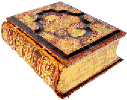The aspects of these two planets are
extremely powerful, as the one fills the defects of the other, while maintaining the plane of high mentality. Their combination is not so spiritual as that just considered, but for this very reason it is more obvious and more puissant in everyday life.
The first point that strikes the observer is that both planets are solitary, and therefore, in a mundane sense, sad. When unfriendly (and in this case the conjunction is definitely evil, unless both planets are very powerful Of well supported by more genial orbs) they bring misfortune and melancholy. The native is lonely, a recluse, occupied with forebodings or, in the best case, with ascetic and austere thoughts. He probably lacks sympathy and may be a cynic or misanthrope. He is difficult to approach; he repels. Yet though slow and unpractical, he is liable to be the slave of whims. Often old age brings definite melancholia. George Ill, the ‘old, mad, blind, despised and dying King’ of Shelley’s sonnet had these planets in conjunction.
Fortunately, however, the influence is frequently transmuted into art, the art of the Weltschmerz. Coleridge, Chop in and Alfred de Musset all had this conjunction. All three are representatives of the minor key. In the case of Coleridge, the conjunction of Venus is added and the softening influence of this planet increased his sentimentality on the one hand and drove him to opium on the other.
Oscar Wilde had these planets in quartile and although both were well aspected, Saturn by Uranus and Neptune by Mercury; the influence proved fatal. (Neptune was in the house of public enemies and Saturn in the tenth, the latter always brings fame and downfall.)
The aspect 150° ordinarily unimportant seems most malefic in the case of these planets. For example, Charles I and Dreyfus both suffered from this_ In political life the influence is very strong, but very treacherous. Gladstone had these planets in conjunction in the 11th and although he had always hosts of friends, he was always being ruined by cabals.
Rossetti, another case in point, was melancholy, and suffered terribly from sensitiveness. Neptune was in conjunction also with Mars and he ended in madness. A trine of Sol made him a great artist in spite of this misfortune.
There is a very extraordinary case of the conjunction of these planets on the cusp of the tenth house, where, helped by Jupiter, the native had what may also be called a double mind. Not only could he do two things at once, but he could never do less!
The friendly aspects are
extremely fortunate, giving extraordinary competence in one’s profession, a complete mastery of technique, superadded to tremendous energy and creative force, great vitality and capacity of comprehension. The effect of the trine aspect is shown in such superb careers as those of Michael Angelo, Pasteur and Lord Roberts. Even the sextile and semi-sextile aspects are of great value in the race for fame. George Sand, almost the only feminine artist since Sappho, had them sextile; and Petrarch and Adelina Patti semi-sextile. Every one of these cases shows the artistic temperament at its best and most triumphal; each shows vast capacity for detail, as well as for magnitude of aim; each assures a fame based on the respect due to singleness of purpose and purity of heart.
 AstroLibrary 🔎
AstroLibrary 🔎